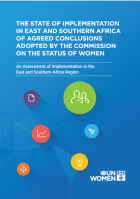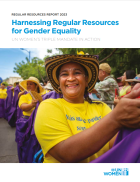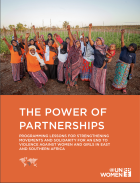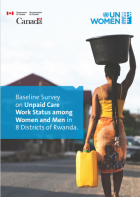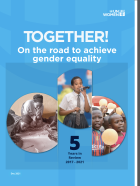1 - 20 of 25 Results
Pagination
Date:
The Commission on the Status of Women (CSW) monitors gender equality commitments and the Beijing Declaration. A study by UN Women East and Southern Africa assessed CSW63–CSW66, finding strong treaty ratification but weak policy implementation. Challenges include inadequate funding, weak national preparations, and limited African influence in CSW negotiations. Recommendations include strengthening coordination, enhancing stakeholder engagement, and improving CSO participation to boost Africa’s impact in global gender equality discussions.
Date:
The UN Women Kenya Annual Report highlights key achievements in advancing women’s empowerment and gender equality.
This report showcases progress in increasing women’s leadership and political participation, strengthening economic empowerment, eliminating violence against women and girls, engaging women in peace and security efforts, and enhancing planning and coordination.
UN Women Kenya remains dedicated to building a future where women are at the heart of developing resilient and sustainable communities.
Date:
The report demonstrates how regular resources are invested to advance integrated triple mandate results. This includes explicit recognition of the expertise and leadership of UN Women staff, which relies on regular resources investments. Country, regional, and global examples illustrate how regular resources, often together with other resources, build momentum in synergy to deliver important advancements for women and girls.
Date:
This report highlights some encouraging advancements. The information presented in this report is based on the latest available data (as of June 2024) on selected indicators in the global indicator framework for the Sustainable Development Goals.
Date:
This Regional Coordination Strategy articulates how UN Women will leverage its unique triple mandate—encompassing normative support, UN system coordination, and operational activities—to mobilize urgent and sustained action to achieve gender equality and the empowerment of all women and girls and support the achievement of the 2030 Agenda.
Date:
This report presents the findings and recommendations from UN Women’s qualitative research on joint initiatives for ending violence against women and girls (EVAWG) implemented between 2016-2022 in East and Southern Africa (ESA).
Date:
The baseline survey on unpaid care work status among women and men in eight districts of Rwanda seeks to understand the care-related dynamics in households, this study utilized both quantitative and qualitative research methodologies. Drawing on Oxfam’s Household Care Survey (HCS) and the Harvard Analytical Framework (also referred to as the Gender Roles Framework). The survey helps to understand how women, men and children spend their time, how care activities are distributed in the household and the access that households have to basic public services and infrastructure that facilitate their everyday survival. The study also explored the social norms that shape power relations and gender division of care labor.
Date:
The Annual Report captures the work of UN Women in Zimbabwe to accelerate Gender Equality and Women's Empowerment in Zimbabwe. It highlights the organisation's initiatives, challenges and milestones achieved in 2021.
Date:
The five years in review publication captures the progress made from 2017 to 2021 across its different focus areas: Leadership and Political Participation, Women’s Economic Empowerment, Ending Violence Against Women, Data and Statistics, HIV/AIDS and the response to the unfolding crisis caused by the COVID-19 pandemic.
Date:
UN Women amplified women’s role in the COVID-19 response highlighting the significant leadership roles women played in leading the response efforts in materials on COVID-19 prevention disseminated in local languages and hand washing facilities were constructed in 6 elementary schools. 528 returnee migrant women workers from the Middle East and domestic workers across Addis Ababa have been provided with basic sanitation and hygiene training and raising awareness on the disproportionate impact of COVID-19 on women, girls, and vulnerable and marginalized groups.
Date:
This report highlights UN Women Nigeria’s work for the year 2020. The report builds around the Nigeria Country Office programmatic areas of intervention and reflects the achievements attained in collaboration with various government and non-governmental partners who contributed to policy advocacy efforts, delivery of services, implementation, and funding of interventions aimed at promoting gender equality and women’s empowerment. The population at large (men, women, boys...
Date:
The review indicated that Ethiopia has not only ratified many of the conventions and treaties related to refugees and asylum seekers, but also formalized these laws into its Constitution and in the national Refugee Proclamation. However, a closer analysis of the health sector focusing on sexual, reproductive, maternal, newborn, child and adolescent health (SRMNCAH) services to women and girls in the humanitarian settings, the laws, policies, strategies, guidelines, programs, and plans of the sector indicated a clear gap.
Date:
UN Women Kenya Annual report aims to share the results and lessons learned for 2020.
Date:
The newsletter aims to serve as an information-sharing platform to promote accelerated action for Gender Equality and Empowerment of Women (GEWE) in Africa. The newsletter features good practices, knowledge, and efforts by the AUC, ECA, and UN Women that help ensure Gender Equality and Empowerment of Women in Africa is sustained.
Date:
The working paper and accompanying policy brief provide an analysis of the progress and gaps across the continent in promoting young women’s role in decision-making and political processes across Africa. The paper further proposes recommendations for consideration by AU and AU Member States including for gender-responsive COVID 19 response and recovery plans that guarantee the participation and integration of the voices of young women.
Date:
An assessment of the gender responsiveness of COVID-19 related prevention, response and recovery measures adopted in Ethiopia, with recommendations on how the gaps and constraints can be alleviated and potential priorities during the recovery phase.
Date:
This series, updated quarterly, illustrates the human impact of UN Women’s work across the world, highlighting the partnerships that make this work possible. These stories share how we and our many partners are striding forward to realize a better world for women and girls
Date:
The publication innovates "The Matrix of Her Success", a case study of UN Women's Economic Empowerment successes in Mali. It delineates the supremacy of the personality of the businesswoman, Mme Sirébara over all other factors. the personality is classified as the essential factor, the "Unbeatable desire to succeed, opportunity readiness" which generates "sustainability potentials as both causal & enabling variables of business". Unique testimony to the unique potentials of UN Women flagships deployed within a public-private-partnership.
Date:
The publication presents UN Women Ethiopia key results on Gender Equality and Women’s Empowerment (GEWE). It highlights thevaluable collaboration with government institutions, development partners, regional organisations, UN Agencies and CSOs as key approach for GEWE’s accomplishments.
Date:
The ten knowledge products provide practical, evidence-based guidance for UN Women staff in various programming areas and organizational priorities such as Women’s Leadership and Political Participation, Violence against Women, Women Economic Empowerment, Resource Based Management (RBM), Resource Mobilization, Partnerships, Women in Humanitarian Action among others.

